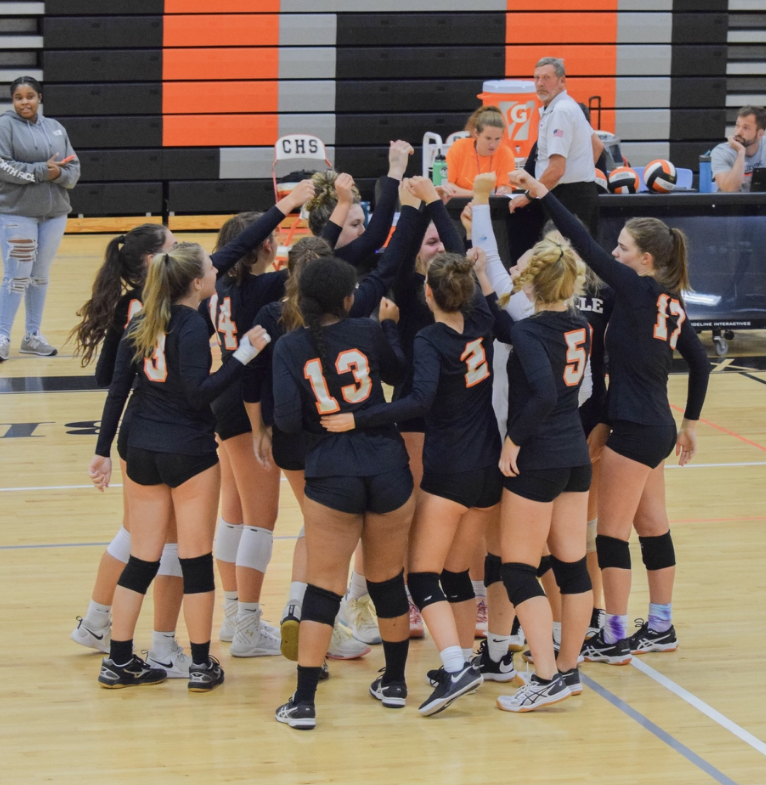The Lasting Effect Sports Have on Mental Health
The volleyball team huddles together in a home game.
October 13, 2022
Mental health has been an ongoing challenge facing teenagers and young adults. UNICEF put out data in 2019 stating that “one in seven adolescents experience mental disorders” and a very alarming statistic, so far in 2022: four college athletes have committed suicide, including the starting star goalie at Stanford, Katie Meyer. Being a student athlete doesn’t only create pressure on the field to perform, but adds stress in order to keep up with grades and school work. The answers now needed are regarding high school student athletes and whether sports have a positive or negative affect on mental health.
While the stats are extremely concerning, some high school students use sports as an escape from their everyday life. Freshman football player Jaire Fitzgerald described how beneficial football is: “When I play football, everything else around me don’t matter, [I] get in the zone, focus on that, and all my problems go away. And you know, it helps me [reach] my dream.” For many high school athletes, playing sports is what keeps them going.
Charlottesville High School’s Football Coach, Coach Cheribin shared an interesting perspective regarding how beneficial sports are: “The positive for your mental health is you are consistently doing something physically active, which we all know there are a lot of good benefits of being physically active for your mental health” A study put out by UCLA showed that bad mental health days declined by over 40% in people who are physically active versus the ones who aren’t. Coach Cheribin also describes the impact teamwork has especially in football: “You have to work with other people in most sports, […] but if you are playing a team sport, having to work with other people, and the challenges with that in terms of working with people with different personalities, different cultures than you, I think all of those thing are really beneficial to your mental health and is going to make you a strong and better individual in the long run” Chemistry within teams is extremely important as it doesn’t just help socially but sets the athletes up for success in a work environment. In team sports such as football, soccer, and volleyball the importance of teamwork and communication are the ingredients of success.
A major negative effect of sports is the pressure that is added to the expectation of being a successful student. From practice everyday to late night game days, falling behind in school work can be detrimental to mental health. Junior soccer player Grace Barnett states: “I definitely have a hard time keeping up with school and I definitely have a hard time switching from school to soccer [mindset].” as well as 10th grader Sammy Gabamedhin who stated: “You have to get your work done at night time but you do what you can” However in some cases, sports can create healthy lifestyle structure: “It helps my time management because I have more of a schedule, I go to practice after school and then do my homework” sophomore Harper Lees stated.
The team and environment can make the biggest difference regarding the athlete’s mental health. Whether it’s losing or the team and coach relationships, the negatives can cause a massive difference emotionally. Coach Cheribin shared his opinion on this topic: “The biggest thing I think comes from negativity within sports, is not having great coaches. Coaches can yell at players and put certain pressures on kids that are unnecessary which can negatively affect you.” He also stated his opinion on the impact losing has on student athletes, something many programs at CHS are working to overcome: “Being on a team that loses a lot can be very stressful on everybody’s mental health and wears on you for a long time when you feel like you are putting in the hard work and you just aren’t getting the results or success that matches the work ethic you are putting in, that can take a toll on your mental health, it makes you question whether it’s not something you are doing or other things when you can’t find the answers to success that can be very negative for a young person.” Although overall Coach Cheribin made it very clear sports are very beneficial to a teenagers mental health.
There is no doubt sports create communities. Whether it’s the smaller community within the team or larger community supporting and surrounding them, the bonds formed are exponential. Coach Cheribin talked about the ability sports have to bring out a certain group of people: “Sports tends to bring out spectators and fans, so when we have good sports programs at our school, it tends to bring the community out and we can bond and get closer as a community.” While creating that community is extremely beneficial it certainly adds to the already high amount of pressure.
Although higher levels of sports typically create much more stress and anxiety, the general idea conveyed is that playing sports in high school has a positive impact on students. As long as there are proper support systems and supportive communities, mental health is greatly benefited by sports.






